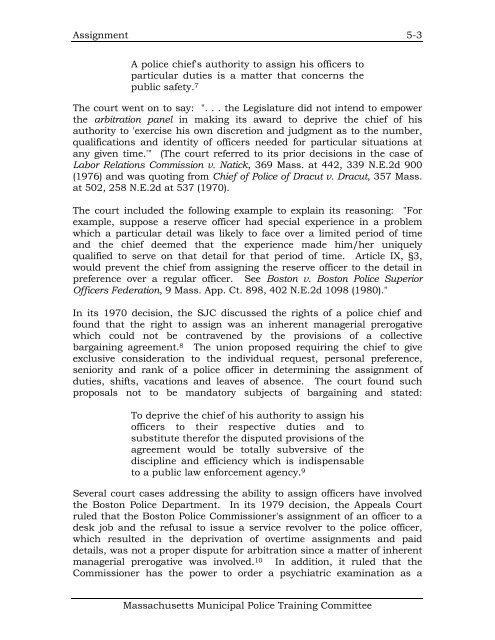Management Rights - AELE's Home Page
Management Rights - AELE's Home Page
Management Rights - AELE's Home Page
Create successful ePaper yourself
Turn your PDF publications into a flip-book with our unique Google optimized e-Paper software.
Assignment 5-3<br />
A police chief's authority to assign his officers to<br />
particular duties is a matter that concerns the<br />
public safety. 7<br />
The court went on to say: ". . . the Legislature did not intend to empower<br />
the arbitration panel in making its award to deprive the chief of his<br />
authority to 'exercise his own discretion and judgment as to the number,<br />
qualifications and identity of officers needed for particular situations at<br />
any given time.'" (The court referred to its prior decisions in the case of<br />
Labor Relations Commission v. Natick, 369 Mass. at 442, 339 N.E.2d 900<br />
(1976) and was quoting from Chief of Police of Dracut v. Dracut, 357 Mass.<br />
at 502, 258 N.E.2d at 537 (1970).<br />
The court included the following example to explain its reasoning: "For<br />
example, suppose a reserve officer had special experience in a problem<br />
which a particular detail was likely to face over a limited period of time<br />
and the chief deemed that the experience made him/her uniquely<br />
qualified to serve on that detail for that period of time. Article IX, §3,<br />
would prevent the chief from assigning the reserve officer to the detail in<br />
preference over a regular officer. See Boston v. Boston Police Superior<br />
Officers Federation, 9 Mass. App. Ct. 898, 402 N.E.2d 1098 (1980)."<br />
In its 1970 decision, the SJC discussed the rights of a police chief and<br />
found that the right to assign was an inherent managerial prerogative<br />
which could not be contravened by the provisions of a collective<br />
bargaining agreement. 8 The union proposed requiring the chief to give<br />
exclusive consideration to the individual request, personal preference,<br />
seniority and rank of a police officer in determining the assignment of<br />
duties, shifts, vacations and leaves of absence. The court found such<br />
proposals not to be mandatory subjects of bargaining and stated:<br />
To deprive the chief of his authority to assign his<br />
officers to their respective duties and to<br />
substitute therefor the disputed provisions of the<br />
agreement would be totally subversive of the<br />
discipline and efficiency which is indispensable<br />
to a public law enforcement agency. 9<br />
Several court cases addressing the ability to assign officers have involved<br />
the Boston Police Department. In its 1979 decision, the Appeals Court<br />
ruled that the Boston Police Commissioner's assignment of an officer to a<br />
desk job and the refusal to issue a service revolver to the police officer,<br />
which resulted in the deprivation of overtime assignments and paid<br />
details, was not a proper dispute for arbitration since a matter of inherent<br />
managerial prerogative was involved. 10 In addition, it ruled that the<br />
Commissioner has the power to order a psychiatric examination as a<br />
Massachusetts Municipal Police Training Committee
















